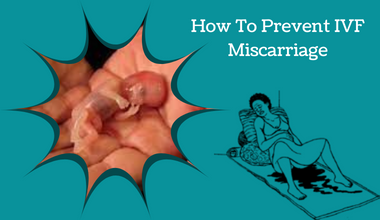Pregnancy is a gift for every woman, but women are not getting pregnant naturally in recent times. It is not happening because of late marriage and the lack of healthy foods. In case if they get pregnant in a natural way, the miscarriage will happen to them accidentally, which lead them to depression. In Vitro Fertilization (IVF) helps women to get pregnant in an artificial way. Worries about non-pregnancy are avoided by this IVF method. The miscarriage rate after IVF is lesser than natural pregnancy. But still, in some cases, the IVF miscarriages are happening.
See how to prevent IVF miscarriage :
Reason for miscarriage after IVF:
Out of 5, only one woman will get a miscarriage after IVF. The women’s age is an important factor for miscarriage. After the age of 43, the women have only a 50% chance to get pregnant will lead to miscarriage. An unborn baby’s fatal genetic problems are the most common reason for miscarriage after IVF, and these problems are not related to the mother. Mothers can able to feel the IVF miscarriage symptoms like heavy bleeding, abdominal pain etc. some of the other causes are:
- Uterine abnormalities
- chromosomal variation
- Lack of Luteal support
- Infection
- Diabetes or thyroid disease for mother
- Antibodies against fetus
- blood clotting disorder
- Lifestyle habits such as smoking, alcohol and recreational drugs.
Prevent IVF miscarriage :
Having a child is a dream for many people and losing a child is the sad part of their life. The couple may get depressed when the child miscarriage even after IVF, and the experts are trying to make several Miscarriage Success Stories. Based on researchers and patients’ own experience, there are some preventions to reduce miscarriage after IVF.
Get a Hysteroscopy:
One of the ways to prevent IVF miscarriage is before having an IVF, the people could get a humble hysteroscopy. Lack of growth, damages and blockages are common to the uterus, and the women may be aware of it.
These various problems may affect the chances of conception. It is advisable to get a hysteroscopy to reduce the risk of miscarriage, and it will give you success after IVF treatment. Hysteroscopy is better than an ultrasound scan to spot uterine problems.
Check your TSH:
Before going for an IVF treatment, you must have a full blood hormone test, but most clinics miss taking this test as they focus on checking other tests like FSH, AMH etc. The TSH test is important because there is a connection between abnormal TSH levels and miscarriage.
Take a right Progesterone:
To maintain your pregnancy, you need to take progesterone in the form of pills, pessaries, gel or injections. You should know the dosage level of progesterone and reduce the chance of miscarriage by taking a right and normal progesterone. The best progesterone as a guard against miscarriage is Intramuscular injections.
Keep medication:
After having an IVF, you should be very careful for every moment. It is essential to take the medicines regularly by them because technically, there is a chance for miscarriage when you are missing 1 or 2 dosages. And also, ask your doctor about the proper medicine interval.
Care about your Cervix:
The miscarriage may happen because of opening your Cervix infertility treatment. This treatment must assess the cervix before your IVF cycle if it is weak or incompetent. The cervical stitch may help in early pregnancy to stop the opening of the cervix, which will reduce the chance of miscarriage.
Look at your lifestyle:
Before planning for IVF treatment, you should take care of your lifestyles like losing weight, staying away from smoking and alcohol, and, most importantly, avoiding non-prescribed medication. It will also prevent miscarriage.
IVF treatment is a great way to get pregnant for those stressing about not getting pregnant naturally. Thus, these are the preventions mentioned above that will prevent you from miscarriage. Try to follow the preventions and have a healthy life with your child.








